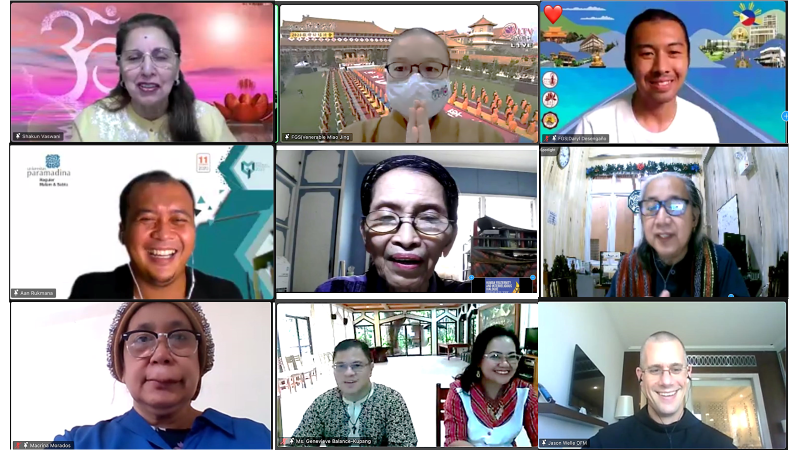by Victoria Corral and Genevieve Balance-Kupang
On Interreligious Dialogue
Thank you for reading this series’ first and second articles: https://staging1.pressenza.com/2021 /12/human-fraternity-and-interreligious-dialogue-seeing-god-in-the-other-1-4/. https://staging1.pressenza.com/2021/ 12/human-fraternity-and-interreligious-dialogue-seeing-god-in-the-other-contd-2-4/.
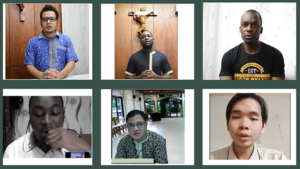
Bro. Maksimilianus Daham (Indonesia); Lucknold Louis-Jean (Haiti), Bro. Bitsong Mouchili Frederic (Cameroon), Huai-En Yu Joseph (Taiwan) leading the prayers of the day. Bro. Romeo Sani Ndzengi (Congo) and Fr. John Mallare delivering the day two recap and the overview of day three correspondingly.
Sharing from People of other Faiths
Religious leaders and interfaith friends shared the core of Fraternity from their respective faith traditions. Through the years, these invited sharers forged brotherhood/sisterhood and harmony shared their respective spiritual values & cultures to others who are different from them.
Knowing that the day’s first speaker is a Hindu, the facilitator Genevieve Balance Kupang commenced with the lines below:
‘We are the birds of the same nest,
We may wear different skins,
We may speak different languages,
We may believe in different religions,
We may belong to different cultures,
Yet we share the same home—Our Earth
Born on the same planet,
Covered by the same skies,
Gazing at the same stars,
Breathing the same air,
We must learn to happily progress together, or miserably perish together,
For [wo]/man can live individually,
But can survive only collectively.’
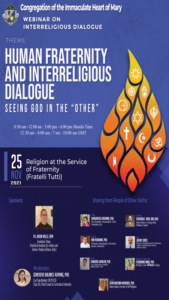
(Credit: John Ervin Felix)
Dr. Shakuntala Vaswani (Hindu)
Dr. Shakun expressed “I am truly blessed and enriched by my experiences since childhood of being with people of different faiths and spiritual traditions, living in an open and neighborly spirit-socializing and exchanging hospitality in the spirit of the dialogue of life.”
Hinduism or Sanatana Dharma gives a lot of freedom to its followers to see God from different perspectives and vantage points. The Hindus believe there is only One God, whom they can worship in many forms and names. Their scriptures, the Vedas state: Ekam Eva dwitiiyam (It/God is one, without a second), and Ekam sat vipra bahudha vadanti (Truth is one; sages call it by various names). These truths make them open and tolerant to the pluralism within Hinduism and it also encourages them to be respectful of other faiths.
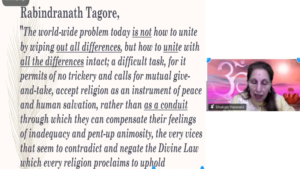
Vaswani quoting Tagore stressing the need to unite with all the differences intact, calls for mutual give-and-take and accept religion as an instrument of peace and salvation.
Venerable Miao Jing Shih/Daryl Desengaño (Buddhists)
Venerable shared the music video “Be the light” accompanied with images showing their compassionate actions and prayers during the past months of the pandemic. FGS cultivates the Spirit based on the teachings and practices of Venerable Master Hsing Yun.
Her community shares happiness by supporting education and culture, developing a passion for their mission and compassion for people. As they reach out to others, they build affinities and grow goodness. As a concrete example of their acts of goodness, Ven. Shih brought with her Daryl Desengaño, their scholar and one of their pioneer graduates in the GMC.
Influenced by Humanistic Buddhism, Desengaño exercises compassion to plants, animals, and people regardless of their religion, race, culture, language, and lifestyle. As a performer, he uses meditation as a tool to have a mindful and holistic act. He treasures the present moment where a lot of time, energy, resources, causes, and conditions meet. Having performed in many parts of the world, he saw how people would like to alleviate suffering be it thru education, arts, business, or charitable activities. Relieving sufferings is the goal of their community.
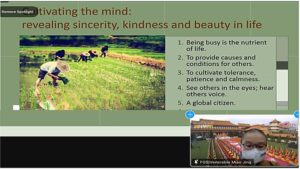
Ven. Shih asked “how do we find sincerity, kindness and beauty in life amid mistreatment, adversity and fear? “By uplifting and seeing the beauty of the living in good or bad times.” She also shared Master Lian-chi Zhu-hong’s answers which you can read on the slide above.
Imam Dr. Aan Rukmana (Muslim)
In Islam, helping, loving others is important, and this is linked with the constant avowal of Bismillah Al-Rahman Al-Raheem. Having benefited from the education he got from both Muslim and Christian institutions, he learned to love beyond his Ummah. “The Muslims’ genuine foundation of love for others even to people belonging to other religions is our authentic devotion and affection of Allah.” He learned also about love from the Christians and quoted Mother Teresa ‘Not all of us can do great things. But we can do small things with great love.’ He learned detachment from the Buddhists and loved reading the Hindu’s Bhagavadgita especially the form of a dialogue between Prince Arjuna and Krishna.
He is deeply impressed by how the Catholics truly love their spiritual leaders like Pope Benedict (whom he met personally) and Pope Francis. He inferred that the Christians’ love for the pope is due to their profound love for God. He reminisced how he continues to forge mutual and life-giving relations with fellow Muslims, Christians, Buddhists, Hindus, among others.
Jeremy Jones (Jew)

Due to health reasons, Jones was not able to make it. As an interfaith community, we prayed for his speedy recovery and wellbeing with a heartfelt prayer led by Imam Aan Rukmana.
Fr. Joel Silagpo (Catholic)

Down-to-earth, pragmatic, and friendly priest Fr. Joel Silagpo showing one of his Muslim comrades from the market in the Prelature of Isabela, Basilan.
Known to many as the simple priest who “sold fish” to build a church amid the Muslim majority community in Lamitan, Basilan,” the dialogue of life is evident in his sharing. Fr. Joel Silagpo forged strong relations with the Christians as well as the Muslims in his community where there is mutual support, understanding and love among them. Fraternity is exemplified in his daily interactions with them embracing the differences and respecting the Muslims as his siblings.
Dr. Humaida Jumalon (Baha’i)
The teachings of the Bahais revolve around the universal oneness of humanity, God, and religion. “The Earth is One Country, Mankind Its Citizens” (Baháʼu’lláh), Fraternity is interwoven with the genuine transformation of society. The world is likened to the body that if one organ is sick, the whole body is affected. The pandemic is a clear demonstration of this one. Every [wo/]man should know the purpose of her/his life on this earth. Love must be seen as a joyous spiritual discovery and growth. Through the daily struggle of his/her material existence, one can deepen his/her spiritual journey, reach transformation, and embody the true essence of brotherhood/sisterhood which can then lead to unity. World order can only be found in the unshakable truth of the oneness of humanity. They oppose man’s tendency to warfare, and self-aggrandizement, countering it with stronger thought of peace, building and empowering communities. “A thought of hatred must be destroyed by a powerful thought of love,” she said.
She posed the questions, “What sort of global civilization shall we have?” Will it be dominated by the shallow reality of materialism? Is it possible that material and scientific progress be governed by moral and ethical principles taking into consideration the many people living in abject poverty, promoting prosperity not just for a few, but for all people everywhere? She articulated that throughout history, God revealed Himself by way of a series of Messengers, and the latest of these Messengers is Bahá’u’lláh.
Dr. Ferdinand Anno (Indigenous Spirituality)
The indigenous peoples (IPs), guardians of the Earth’s last frontiers have stories to tell of how they live with Divinity and with others. Dr. Anno began by narrating a story of how the first foreign missionaries learned about the egalitarian qualities of the IPs. As opposed to the highly individualistic, hierarchical consciousness of others, he highlighted the IPs’ propitiously communal, kinship system of organization, considering the “other” and mindful of the neighbors as expressed in “Singpangili “ or “sintatako” (We-Spirituality in the Cordilleras). The human is not a king, but kin to everybody.
The supreme being cannot be perceived apart from creation. God is in creation and the whole world is God’s temple. The earth is a sacred text, full of mystery. The land is the basis of human self-hood and identity and all realities. The IPs perceive realities from a wholistic, eco-centric perspective as opposed to the anthropocentric worldview, and the dominant powers of “settler-colonial societies.”
The human is part of the circle of life, a fellow member of the earth community. There is no sharp dualism, no clear-cut distinction between the sacred and the secular, between the religious and non-religious. There is no compartmentalized living. What the IPs see in creation is already revelatory of divinity. The literal act of cultivating the land is the cultus. He quoted Noam Chomsky’s declaration that the IPs have the spirituality and the value system to save us towards our march to environmental plunder and depredation.
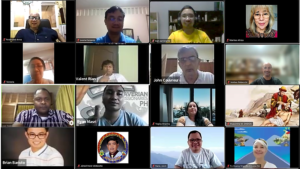
Dean Macrina Morados, (Islam)
“The first thing that Prophet Muhammad (pbuh) did when he and some Muslims arrived in Madinah during the historic hijrah (migration) was the Institutionalization of the principle of “Brotherhood and [Sisterhood]” that transcends beyond tribal affiliation, race, and ethnicity. This was in response to the most challenging times faced by the early believers of Islam amidst persecution and hate towards them.” Morados, reflecting on the Prophet’s noble act said “this must remind us to emulate the principle of Fraternity in contemporary time to equip and inspire us all to hurdle the challenges ahead. She quoted a hadith akin to the Golden Rule: “No one becomes a true believer unless s/he wishes for his/her brother/sister what s/he wishes for himself/herself.” This truly captures our theme “Human Fraternity and Interreligious Dialogue: Seeing God in the Other.” This principle of solidarity and fraternity is inclusive as affirmed by the Qur’anic verse on pluralism (Al-Qur’an 49:13). We belong to the family of humanity. Islam enjoins the values of tolerance, mercy, and compassion to sustain fraternal love and peace among people of different faith traditions.
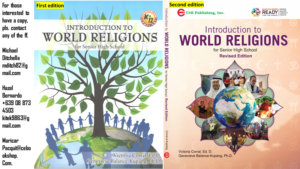
This book, Introduction to World Religions, was explained as a collaboration of Catholic authors with believers of other faiths. The importance of writing textbooks for our children to learn about the religious “others” was appreciated by Fr. Jason Welle, the next speaker.
RELIGION AT THE SERVICE OF FRATERNITY (FRATELLI TUTTI)
Fr. Jason Welle, OFM, Pontifical Institute for Arabic and Islamic Studies, Rome
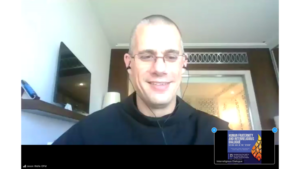
Fr. Jason Welle, OFM, discussing religion at the service of fraternity
Looking back at the lessons learned between the encounter of St. Francis of Assisi and Sultan al-Malik al-Kamil of Egypt at Damietta gives us a window into Fr. Welle’s topic.
He noted the many occasions when Pope Francis used the word fraternity/brother [and sisters] in addressing the people of faiths in his visits to many parts of the world. He elucidated the difference of fraternity and friendship which many of us appreciated. He said that fraternity is a given, we were borne as brothers and sisters to each other as we came from the same Creator of life. Fraternity is a given. We did not choose to be brothers and sisters to one another. God gifted us with brothers and sisters. Our faith tells us to love one another as brothers and sisters as we originated from the same Divine Creator. One of our takeaways is that, while we can “unfriend” people who we no longer like or love, we cannot “unbrother” the brothers that God has gifted us.
The challenge is how to put fraternity into practice. Friendship is a choice we make. We consider those people who help and protect us as friends. Fr. Welle posed a question to the participants, “Will it make a difference if we say, “Religion at the Service of Fraternity or Religion at the Service of Friendship“? Which word implies intimacy and trust? How do we treat each other to counter the globalization of indifference and wake up to our responsibilities as siblings to one another? These questions led the participants to further reflections.
The goal of interreligious dialogue is to establish friendship, and further added that Pope Francis whenever he speaks about IRD is always in the context of fraternity. Our Muslim brothers/sisters love to hear the word fraternity implying that we are all created by one God.
In closing, he challenged again each participant with the question “How do I put fraternity into practice?” Though some people have grown cold to each other, the call to fraternity is a call to look back at Cain and Abel’s narrative, particularly on Cain asking, “Am I my brother’s keeper?” Yes, I am my brother’s [sister’s] keeper and I have a deeply rooted responsibility towards him/her.
As a response to Fr. Welle, Fr. Mallare expressed “We can always read the encyclical and the documents discussed, but we seldom analyze them. We are grateful for your systematic presentation and analysis, Fr. Jason.” Fr. Welle was appreciated for his exposition of “Fratelli Tutti,” “Human Fraternity for World Peace and Living Together, and the lessons learned in Damietta between St. Francis and the Sultan’s encounter.” A lively and meaningful interchange followed where questions, answers and comments were satisfactorily exchanged to the benefit of all.
To cap the three-day webinar, Fr. Adorable Castillo, CICM, the Coordinator expressed his heartfelt gratitude to the resource speakers, participants, his fellow confreres, co-organizers, and the technical team. In the context of the universal Christian mission, he said that this webinar and the book “Witnessing to the God of Love and Mercy” is a humble contribution to the promotion of fraternity among all peoples. As a token of friendship and commitment for peace and harmony among peoples of different races, cultures, and religions, his congregation has sent to participants the book mentioned above.
The three-day webinar ended with a beautiful closing prayer.
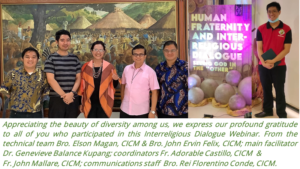
——————————————————————————————–
About the Authors:

Victoria Corral is a retired associate professor, researcher, and author. She has published papers in the Unitas journal and the Voice of Intellectual Man. She authored Church: A Community in Faith, Faith that does Justice, and Introduction to World Religions to continue and expand her ministry and reach more readers nationwide.
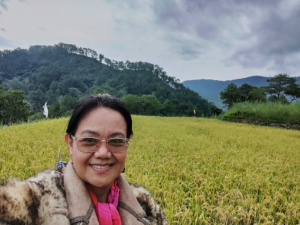 Genevieve Balance-Kupang. An affiliate of the Silsilah Dialogue Movement and a core team member of the Episcopal Commission on Interreligious Dialogue of the CBCP. C-authored a book on World Religions and Belief Systems published by C & E Publishing, Inc., and the series Our Nation, Our World by Sibs Publishing House, Inc. Chair of the Special Interest Groups (SIG) of the World Council for Curriculum and Instruction (WCCI), and a trustee of the Asian Social Institute. A researcher, consultant, anthropologist, and advisor to individuals and organizations engaged in working for good governance, justice, integrity of creation, peace, the indigenous peoples, and societal transformation processes. With a career in the academe and NGOs.
Genevieve Balance-Kupang. An affiliate of the Silsilah Dialogue Movement and a core team member of the Episcopal Commission on Interreligious Dialogue of the CBCP. C-authored a book on World Religions and Belief Systems published by C & E Publishing, Inc., and the series Our Nation, Our World by Sibs Publishing House, Inc. Chair of the Special Interest Groups (SIG) of the World Council for Curriculum and Instruction (WCCI), and a trustee of the Asian Social Institute. A researcher, consultant, anthropologist, and advisor to individuals and organizations engaged in working for good governance, justice, integrity of creation, peace, the indigenous peoples, and societal transformation processes. With a career in the academe and NGOs.


